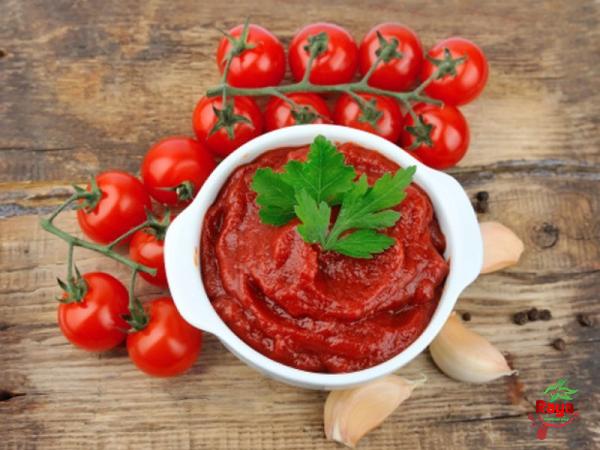The Evolution and Impact of Tomato Sauce Cans: A Comprehensive Summary Introduction: Tomato sauce is an essential condiment enjoyed by millions of people worldwide. It is a versatile ingredient that enhances the flavors of various recipes, such as pasta dishes, pizzas, and sandwiches. The rise of tomato sauce cans revolutionized the industry, making it more convenient for consumers to store and access this beloved product. In this summary, we will explore the evolution, impact, and significance of tomato sauce cans, exploring their history, production process, environmental implications, and market dominance. 1. Historical Evolution of Tomato Sauce Cans: The tomato sauce can has come a long way since its inception. The canning process began in the early 19th century, with Nicholas Appert and Peter Durand leading the way in the preservation of food through canning. However, it wasn’t until the late 19th and early 20th century that tomato sauce started to be commercially canned. The adoption of canning technology allowed producers to preserve tomato sauce for extended periods, with the added benefit of convenience and ease of distribution. 2. Production Process: The production process of tomato sauce cans involves several steps, including tomato harvesting, washing, sorting, and cooking. Once the tomatoes are cooked and reduced into a sauce, the product is then filled into cans. The cans are sealed through a canning process, ensuring the preservation of the sauce. Modern canning techniques, such as retorting, provide a hermetically sealed package that maintains the quality, flavor, and safety of the tomato sauce. 3. Environmental Implications: While tomato sauce cans have brought convenience to consumers, their production and disposal do have environmental implications. The production of aluminum or steel cans requires significant energy and natural resources, contributing to greenhouse gas emissions. Recycling initiatives have helped mitigate some of these negative impacts, but there is still progress to be made. Alternative packaging materials, such as glass jars or pouches, are being explored to further reduce the environmental footprint of tomato sauce packaging. 4. Market Dominance and Economic Impact: Tomato sauce cans dominate the market for several reasons. Firstly, the canning process ensures a longer shelf life for the product, allowing for easy storage and distribution. Secondly, the affordability and convenience of canned tomato sauce have made it a popular choice for consumers. Furthermore, the canning industry has created employment opportunities and contributed significantly to the economy in regions where tomato production is prevalent. 5. Health Considerations: In recent years, consumer demand for healthier and more natural food products has influenced the tomato sauce industry. Many consumers are seeking options that are free from additives, preservatives, and excessive sodium. Some manufacturers now offer organic, low-sodium, and no-added-sugar tomato sauce varieties to cater to these health-conscious individuals. However, it is important for consumers to read labels and make informed choices to ensure they are selecting the healthiest options available.

tomato paste
 6. Innovations in Tomato Sauce Cans:With the rising competition in the food industry, tomato sauce can manufacturers have embraced innovation to stay relevant. Some notable advancements include easy-open lids, portion-sized cans, and resealable cans, which enhance convenience and reduce waste. Additionally, companies are incorporating technology to improve the cooking process, resulting in better-tasting tomato sauce. These innovations aim to cater to the evolving needs and preferences of consumers. 7. Recipe Versatility and Culinary Applications: Tomato sauce cans have played a crucial role in promoting culinary creativity and versatility. Apart from being a staple ingredient for pasta sauces, tomato sauces are widely used in other recipes such as soups, stews, casseroles, and marinades. The easy availability and long shelf life of tomato sauce cans have facilitated culinary experimentation and made it more convenient for home cooks and professional chefs alike. Conclusion: The advent of tomato sauce cans revolutionized the tomato sauce industry, making it more accessible, convenient, and affordable for consumers. However, it is crucial to address the environmental considerations associated with canning and explore sustainable alternatives. The market dominance of tomato sauce cans, coupled with innovations and culinary versatility, has solidified their place as an enduring and indispensable aspect of our gastronomic world.Title: The Evolution and Impact of Tomato Sauce Cans in the Business Industry 1. The Rise of Canned Tomato Sauce: A Game-Changer in the Market Canned tomato sauce brought about significant changes in the business industry for both manufacturers and retailers. The convenience and extended shelf life offered by canned tomato sauce allowed manufacturers to expand their market reach beyond local boundaries. With the ability to distribute their products to wider regions, manufacturers experienced increased revenue and growth opportunities. Retailers also benefitted from the popularity of canned tomato sauce, as it became a staple in households, ensuring consistent demand and sales. 2. Brand Differentiation in the Canned Tomato Sauce Market The widespread availability of canned tomato sauce led to increased competition among manufacturers. In response, companies began focusing on brand differentiation to attract and retain customers. Factors such as taste, quality, price, packaging, and marketing campaigns played a crucial role in distinguishing one brand from another. Building a strong brand image allowed manufacturers to develop customer loyalty, expand their customer base, and maintain a competitive edge in the market.
6. Innovations in Tomato Sauce Cans:With the rising competition in the food industry, tomato sauce can manufacturers have embraced innovation to stay relevant. Some notable advancements include easy-open lids, portion-sized cans, and resealable cans, which enhance convenience and reduce waste. Additionally, companies are incorporating technology to improve the cooking process, resulting in better-tasting tomato sauce. These innovations aim to cater to the evolving needs and preferences of consumers. 7. Recipe Versatility and Culinary Applications: Tomato sauce cans have played a crucial role in promoting culinary creativity and versatility. Apart from being a staple ingredient for pasta sauces, tomato sauces are widely used in other recipes such as soups, stews, casseroles, and marinades. The easy availability and long shelf life of tomato sauce cans have facilitated culinary experimentation and made it more convenient for home cooks and professional chefs alike. Conclusion: The advent of tomato sauce cans revolutionized the tomato sauce industry, making it more accessible, convenient, and affordable for consumers. However, it is crucial to address the environmental considerations associated with canning and explore sustainable alternatives. The market dominance of tomato sauce cans, coupled with innovations and culinary versatility, has solidified their place as an enduring and indispensable aspect of our gastronomic world.Title: The Evolution and Impact of Tomato Sauce Cans in the Business Industry 1. The Rise of Canned Tomato Sauce: A Game-Changer in the Market Canned tomato sauce brought about significant changes in the business industry for both manufacturers and retailers. The convenience and extended shelf life offered by canned tomato sauce allowed manufacturers to expand their market reach beyond local boundaries. With the ability to distribute their products to wider regions, manufacturers experienced increased revenue and growth opportunities. Retailers also benefitted from the popularity of canned tomato sauce, as it became a staple in households, ensuring consistent demand and sales. 2. Brand Differentiation in the Canned Tomato Sauce Market The widespread availability of canned tomato sauce led to increased competition among manufacturers. In response, companies began focusing on brand differentiation to attract and retain customers. Factors such as taste, quality, price, packaging, and marketing campaigns played a crucial role in distinguishing one brand from another. Building a strong brand image allowed manufacturers to develop customer loyalty, expand their customer base, and maintain a competitive edge in the market.
Specifications of tomato paste
 3. Packaging Innovations: Enhancing Shelf Appeal and Consumer Experience Packaging plays a vital role in the success of any product, and canned tomato sauce is no exception. Manufacturers continuously invest in packaging innovations to enhance shelf appeal and consumer experience. Eye-catching label designs, attractive colors, and informative product descriptions help grab the attention of consumers and stand out on supermarket shelves. Additionally, manufacturers have introduced innovative can designs, such as easy-open lids and resealable options, improving convenience and reducing waste for consumers. 4. Globalization and Market Expansion Opportunities The introduction of canned tomato sauce created immense opportunities for market expansion globally. Manufacturers have leveraged the demand for tomato sauce in international markets, allowing them to reach a broader customer base and diversify their revenue streams. Globalization has facilitated the availability of a wide range of tomato sauce brands from different regions, giving consumers access to various flavors and ingredient combinations, enhancing their culinary experiences. 5. Supply Chain Management and Logistics The success of canned tomato sauce hinges on efficient supply chain management and logistics. Manufacturers need to ensure a smooth flow of raw materials, like tomatoes, from farms to processing facilities. Timely delivery of canned products to distributors and retailers is crucial to meet consumer demands and maintain product quality. Effective distribution networks, warehousing facilities, and transportation systems are essential for the industry to thrive and fulfill consumer needs. 6. Private Label Brands: A Growing Market Share In addition to established brands, private label canned tomato sauce has gained significant ground in the market. Private label brands offer retailers an opportunity to develop and market their own line of tomato sauce products. By leveraging their existing customer base, retailers can compete with established brands and increase their profit margins. Private label brands also allow retailers to offer more affordable options to price-conscious consumers, expanding their market reach. 7. Export and Import Opportunities for Tomato Sauce Cans The rise of tomato sauce cans and their popularity has led to increased export and import opportunities for countries with abundant tomato production. Producers in regions known for their high-quality tomatoes can capitalize on this market demand and export their tomato sauce products to other countries. This not only stimulates the economy but also fosters international trade and collaboration among nations.
3. Packaging Innovations: Enhancing Shelf Appeal and Consumer Experience Packaging plays a vital role in the success of any product, and canned tomato sauce is no exception. Manufacturers continuously invest in packaging innovations to enhance shelf appeal and consumer experience. Eye-catching label designs, attractive colors, and informative product descriptions help grab the attention of consumers and stand out on supermarket shelves. Additionally, manufacturers have introduced innovative can designs, such as easy-open lids and resealable options, improving convenience and reducing waste for consumers. 4. Globalization and Market Expansion Opportunities The introduction of canned tomato sauce created immense opportunities for market expansion globally. Manufacturers have leveraged the demand for tomato sauce in international markets, allowing them to reach a broader customer base and diversify their revenue streams. Globalization has facilitated the availability of a wide range of tomato sauce brands from different regions, giving consumers access to various flavors and ingredient combinations, enhancing their culinary experiences. 5. Supply Chain Management and Logistics The success of canned tomato sauce hinges on efficient supply chain management and logistics. Manufacturers need to ensure a smooth flow of raw materials, like tomatoes, from farms to processing facilities. Timely delivery of canned products to distributors and retailers is crucial to meet consumer demands and maintain product quality. Effective distribution networks, warehousing facilities, and transportation systems are essential for the industry to thrive and fulfill consumer needs. 6. Private Label Brands: A Growing Market Share In addition to established brands, private label canned tomato sauce has gained significant ground in the market. Private label brands offer retailers an opportunity to develop and market their own line of tomato sauce products. By leveraging their existing customer base, retailers can compete with established brands and increase their profit margins. Private label brands also allow retailers to offer more affordable options to price-conscious consumers, expanding their market reach. 7. Export and Import Opportunities for Tomato Sauce Cans The rise of tomato sauce cans and their popularity has led to increased export and import opportunities for countries with abundant tomato production. Producers in regions known for their high-quality tomatoes can capitalize on this market demand and export their tomato sauce products to other countries. This not only stimulates the economy but also fosters international trade and collaboration among nations.
buy tomato paste
 8. Food Service Industry: The Role of Tomato Sauce Cans Tomato sauce cans have become a staple ingredient in the food service industry, providing quick and consistent flavor profiles for restaurants, cafeterias, and catering services. With the ease of storage and the long shelf life of canned tomato sauce, businesses in the food service industry can rely on a readily available and reliable product to enhance their menu offerings. This convenience factor significantly reduces preparation time and allows chefs and kitchen staff to focus on other aspects of meal preparation. 9. Social Responsibility and Corporate Sustainability The success of canned tomato sauce goes beyond financial gains for manufacturers and retailers. As the market expands, companies recognize the importance of corporate social responsibility and sustainable practices. From sourcing tomatoes responsibly to implementing recycling initiatives for cans, manufacturers are taking steps to minimize their environmental impact and support sustainable agriculture. Consumers increasingly gravitate towards brands that consider the broader social and environmental implications of their products. 10. Growing Market for Tomato Sauce Varieties With the popularity of tomato sauce cans, the market has witnessed an increase in the variety of tomato-based products available. Manufacturers have introduced a range of options, including chunky tomato sauce, spicy tomato sauce, and flavored tomato sauces infused with herbs and spices. By diversifying their product offerings, manufacturers can cater to different taste preferences, dietary restrictions, and culinary trends, ensuring a broader customer base and market share. Conclusion: The introduction of tomato sauce cans has transformed the business industry, revolutionizing the way tomato sauce is produced, marketed, and consumed. This convenient packaging option has expanded market reach and opened up new avenues for growth and innovation. As the market continues to evolve, manufacturers must remain adaptable and responsive to changing consumer preferences and sustainable practices. With ongoing advancements in packaging, distribution, and product variety, the impact of tomato sauce cans on the business industry is bound to grow even further in the years to come.
8. Food Service Industry: The Role of Tomato Sauce Cans Tomato sauce cans have become a staple ingredient in the food service industry, providing quick and consistent flavor profiles for restaurants, cafeterias, and catering services. With the ease of storage and the long shelf life of canned tomato sauce, businesses in the food service industry can rely on a readily available and reliable product to enhance their menu offerings. This convenience factor significantly reduces preparation time and allows chefs and kitchen staff to focus on other aspects of meal preparation. 9. Social Responsibility and Corporate Sustainability The success of canned tomato sauce goes beyond financial gains for manufacturers and retailers. As the market expands, companies recognize the importance of corporate social responsibility and sustainable practices. From sourcing tomatoes responsibly to implementing recycling initiatives for cans, manufacturers are taking steps to minimize their environmental impact and support sustainable agriculture. Consumers increasingly gravitate towards brands that consider the broader social and environmental implications of their products. 10. Growing Market for Tomato Sauce Varieties With the popularity of tomato sauce cans, the market has witnessed an increase in the variety of tomato-based products available. Manufacturers have introduced a range of options, including chunky tomato sauce, spicy tomato sauce, and flavored tomato sauces infused with herbs and spices. By diversifying their product offerings, manufacturers can cater to different taste preferences, dietary restrictions, and culinary trends, ensuring a broader customer base and market share. Conclusion: The introduction of tomato sauce cans has transformed the business industry, revolutionizing the way tomato sauce is produced, marketed, and consumed. This convenient packaging option has expanded market reach and opened up new avenues for growth and innovation. As the market continues to evolve, manufacturers must remain adaptable and responsive to changing consumer preferences and sustainable practices. With ongoing advancements in packaging, distribution, and product variety, the impact of tomato sauce cans on the business industry is bound to grow even further in the years to come.









Your comment submitted.